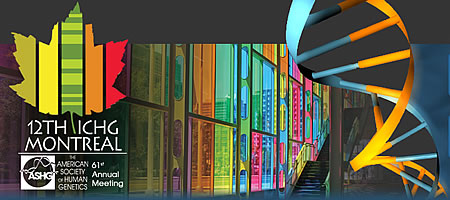Last updated: June 04, 2012
NHGRI sets sights on 61st ASHG meeting in Montreal
NHGRI sets sights on 61st ASHG meeting in Montreal
By Raymond MacDougall
Associate Communications Director for Intramural Research
Visit NHGRI at booth #219

National Human Genome Research Institute (NHGRI) researchers will present seven platform presentations, a plenary and an invited talk and 35 posters at the annual meeting of the American Society of Human Genetics (ASHG) from Oct. 11-15, 2011, in Montreal. Approximately 7,000 researchers from more than 60 countries are expected to attend this year's ASHG meeting, which is being held jointly with the International Congress of Human Genetics.
"Presentations at the annual ASHG meeting encompass the full range of genomics research," said NGHRI Director Eric D. Green, M.D., Ph.D. "The variety of sessions and interactions with our colleagues throughout the country and the world promote collaboration and a greater awareness of the remarkable progress being made in genomics."
Dr. Green and other NHGRI scientists and staff will be available at exhibit booth #219 to discuss NHGRI initiatives, grant and training opportunities, and the intramural research program. For a schedule of when NHGRI scientists and staff will be available at the booth, please go to 2011 NHGRI ASHG Meeting Exhibit: Schedule of Scientists and Staff.![]()
Wednesday, Oct. 12, 2011
Leslie Biesecker, M.D., chief of the Genetic Disease Research Branch will describe the recent discovery of a gene mutation that activates Proteus syndrome, a rare condition that causes irregular overgrowth of skin, connective tissue and other tissues. Joseph Merrick, the 19th century Englishman also known as the Elephant Man, is thought to have had Proteus syndrome, though it has yet to be proven genetically.
NHGRI presenters will also showcase:
- Translational genomics, including a gene that is mutated in a blood disorder called gray platelet syndrome. presented by Thierry Vilboux, visiting research fellow in the Medical Genetics Branch.
- Next-generation sequencing approaches that identified the skin condition of a patient in the NIH Undiagnosed Diseases Program, presented by Karin Fuentez-Fijardo, of the Medical Genetics Branch.
- A recent gene discovery using whole-exome sequencing of a mitochondrial enzyme causing combined malonic and methylmalonic aciduria, presented by Jennifer Sloan, of the Genetics and Molecular Biology Branch.
NHGRI posters will include:
- Clinical genomic research on a kidney disorder called Fanconi syndrome.
- A debilitating muscle disease called distal myopathy.
- A syndrome called craniosynostosis in which skull plates fuse too early.
- Rare diseases encountered in the NIH Undiagnosed Diseases Program.
- The Phenotype-Genotype Integrator, which synthesizes genome-wide association study data with other genetic resources.
Thursday, Oct. 13, 2011
Charles Rotimi, Ph.D., director of NHGRI's Center for Research on Genomics and Global Health, will discuss the challenges of large-scale international collaborations, such as the HapMap and 1000 Genomes projects. He will focus on the need to harmonize cultural values and norms and different legal and regulatory requirements.
Irini Manoli, of NHGRI's Genetics and Molecular Biology Branch, will present on a disorder involving methylmalonic acid buildup discovered in transgenic mouse models. The disorder causes "failure to thrive" in babies, severe metabolic instability, seizures and strokes, developmental delays, pancreatitis and kidney disease. The researchers will be discussing exciting progress on disease diagnostics and treatment.
On Thursday and Friday, NHGRI researchers will present team projects on a wide array of genomics topics, including posters on:
- A skull formation disorder known as brachycephaly, where the bones of the head fuse prematurely and lead to an abnormal shape — by the Cancer Genetics Branch.
- A genome-wide association study of young, healthy individuals in Ireland, measuring uric acid and bile levels in their blood — by the Inherited Diseases Research Branch.
- the genetic disorder, Joubert syndrome, especially its kidney and liver disease implications — by the Medical Genetics Branch.
- A software tool for assessing colorectal cancer risk and its compatibility with the U.S. Surgeon General's "My Family Health Portrait" tool — by the Genetic Disease Research Branch and Genomic Healthcare Branch.
- A genome-wide association study of biomarkers for inflammation and such conditions as cardiovascular disease, diabetes and obesity — by the Office of Population Genomics.
- Whether U.S. doctors are receiving direct-to-consumer genetic test results from their patients — by the Social Behavioral Research Branch.
Friday, Oct. 14, 2011
NHGRI researchers will be involved in two talks on:
- The causal gene mutation in Proteus syndrome detected through the use of deep sequencing of specific regions of DNA, presented by Marjorie Lindhurst.
- Cystinosis, a disease of impaired processing of the amino acid cystine, which causes crystals to build up and damage cells. It will also examine the diagnostic benefit of white blood cell analysis in cystinosis and similar disorders, presented by Sihoun Hahn, Washington University, on behalf of a research team that includes NHGRI.
For a full list of NHGRI presentations at ASHG, including abstracts of research, please go to Participation from the National Human Genome Research Institute (NHGRI)![]()
To view the PDF document(s) on this page, you will need Adobe Reader. ![]()
